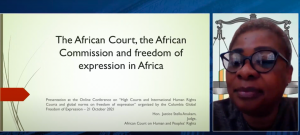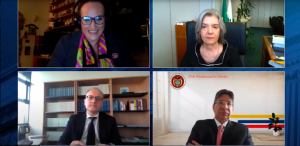By RightsViews Staff Writer Carina Goebelbecker
Is it fake news, fact, or some form of the truth? Freedom of expression holds space for all these possibilities. The “Courts and Global Norms on Freedom of Expression” two-part conference programmed by Columbia Global Freedom of Expression illuminated all these possibilities and their implications within a larger national and international setting. The streamed session on Thursday October 21st explored the cultural context of freedom of expression and how norms intersect with policy, practices, and beliefs.
Columbia Global Freedom of Expression was founded in 2014 with the intention of connecting international professionals and activists with their communities and networks of support. The goals of the conference were for the speakers to share their experiences with courts to the public and to promote dialogue. Columbia University President and Founder of the Columbia Global Freedom of Expression Lee C. Bollinger delivered the opening remarks, noting how global norms of freedom of expression have been established and continue to be created and interpreted.

The conference was split into two sessions. The first session focused on the application of international legal standards and comparative law practices in deciding upon freedom of expression cases. Speakers included Nigerian Judge Stella Anukam, United States Supreme Court Justice Stephen G. Breyer, Indian Judge Dhananjaya Y Chandrachud, Mexican Judge Eduardo Ferrer Mac-Gregor Poisot, and Ecuadorian Professor and Lawyer Daniela Salazar Marín. Despite being from different cultural contexts, there were many thematic similarities across the speaker’s presentations. Judge Anukam discussed how the right to remedy is very difficult to implement while Professor Marín noted how judges do not always consistently commit to reinforcing rights.
Many of the speakers touched on how freedom of expression is necessary for a legitimate democracy. Judge Eduardo Ferrer Mac-Gregor Poisot highlighted the importance of setting standards to protect journalists, while Judge Dhananjaya Y Chandrachud introduced the role of satire to “come against intolerance in our society” and promote critical freedom of expression.

A major point of interest was the concept of hate speech as a component of freedom of expression, as hate speech online relates to a global increase violence towards marginalized populations. There is a debate that policies created to control hate speech infringe upon freedom of expression. Justice Breyer argued for proportionality regarding hate speech, a middle ground between the European model where hate speech is outlawed and the American model where there is very little regulation on hate speech. Justice Breyer suggested that hate speech should be permitted unless it is promoting violence, as freedom of speech is protected by the first amendment in the United States. Justice Breyer stated that “freedom of speech is not there for people you like…it’s there for the people you don’t like,” for censorship of any kind will weaken a democracy.
Hate crimes have reached their highest level in more than a decade in the United States (2020). Roughly two out of every three hate crimes reported last year were racially motivated. There is a clear correlation between the rise in hate speech in the digital sphere and increased physical harm. Do national and transnational governing bodies have a responsibility to take action to stop these biases from forming online?
The second session of the conference touched on the latter question, interrogating challenges for judicial protection of freedom of expression in the digital sphere. Our society’s reliance on social media for mobilization and connection comes with great risk of security and regulation. Albanian Judge Darian Pavli, Colombian Justice Alejandro Linares Cantillo, and Brazilian Professor Cármen Lúcia Antunes Rocha were speakers for the second session. Judge Pavli noted that the subject of hate speech on social media is significant enough that legal matters should be subject to judicial review rather than contract law. Judge Cantillo suggested a self-regulation policy for social media platforms, while Professor Rocha brought to light the power of these digital platforms to empower and protect marginalized people.

Facebook is one of the most prominent examples of social media platforms struggling to contend with freedom of expression and hate speech. Recently, former Facebook employee and whistleblower Frances Haugen testified to a United States Senate subcommittee that Facebook’s AI technology deceivingly removes very little hate speech from the website. Additionally, the company is aware that Instagram (a platform owned by Facebook) is toxic for teenage girls and their body image. The case of Facebook reveals the dangers of pairing a lack of transparency with slim to no content regulation.
The impact of social media platforms is transnational, providing simultaneous possibility for global connection and global destruction. Freedom of expression is a global conceit, fluctuating based on culture and governance. As Judge Pavli stated, the “biggest question of our era…is what rights social media platforms have.” The strongest solution will be generated from a place of deep consideration for the rights of the human beings impacted by these platforms.
Photos courtesy of Carina Goebelbecker
